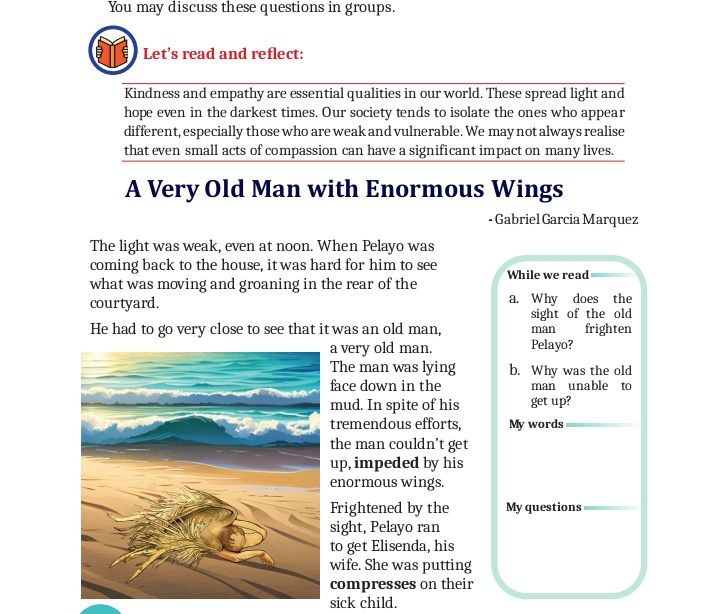IF
IF
- Rudyard Kipling
1. The first stanza of 'IF' truly deals with the need for self confidence. Crisis is a common incident in the life of a human being. Ups and downs, victories and defeats may come. But a person must face all these situations with confidence. Situations must not make us depressed.
2. Patience is a virtue. It is a quality, which many people wish to have, but find it very hard to devolop. Patience requires hard effort. A person who is patient can be a good listener and a good friend. Waiting with patience can bring about good results.
3. Honesty and fortitude of character, are two good values in life. A perfect man must build up good character and thesetwo values must make a foundation for him. A man must speak the truth always. He must not tell lies or talk bad about anyone. He must be strong in mental attitude, he must not be depressed when someone talk bad about him. He must "believe" In himself.
4. Even if others talk bad about us, we should not pay attention. And we must try not to talk bad about them. Only people with extraordinary goodness can keep control when others talk bad about them. Such people have patience and can wait for good things to happen in life. They have good virtues.
5. Man should dream. Dreams should lead man into success. Aims and ambitions in life are the result of one's dreams. But man should not become dreamers. His dreams must not master him. His thoughts must be good. They must not master him too.
6. True. A successful person can control bis emotions and feelings. His 'head' will be master of his 'heart'. Emotions are dangerous, especially negative emotions like jealousy, revenge, hate and fear, make a lot of loss in life. When one controls his feelings, he succeeds. He knows the true value of hard work and labour.
7. Man likes to speak about "loss", and as a resultwe get sympathy of others. But to Kipling, a man must act mature, he must not complain always. Sometimes we put the blame of our loss on others. That too must be avoided. Rudyard Kipling is a gentleman and wants others to be like that too.
8. A set of virtues which can make a person 'a perfect gentleman' is laid down by Rudyard Kipling. A man must mingle with the crowd and still keep all good qualities. He must be truthful and honest. He must not lie or talk bad about others. This some person must keep relations with the high class or even kings, but still have common touch. He must be trusted by all men, he will be a good friend too. This man will be perfect and make use of all the time he gets - every second.
Activity - II
1. The poem 'IF' lays down a set of rules for life, a set of virtues for a good living and each line is full of meaningful tips of the values a gentleman should cultivate.
2. Two 'Imposters' Kipling talks about are Triumph and Disaster. Both of them are uninvited guests, they come suddenly and unexpectedly. But man should learn to control them. He must not be too excited, nor should he be to depressed when he fails in life.
3. Unexpected loss shouldn't make a person depressed. We should be confident to start once again from the big zero. Luck and fortune does not last long. When we start again, we can gain much more than we expect. We must also not be a personwho complains always. We must be self confident and have self control.
4. The poem is not a poem. It is an advice or a set of rules for a good living. A parent who is very concerned about his child, gives him many conditions for a good life. All conditions are examples taken from everyday life. By following these rules the society csn have nice citizens.
5. The poem is a monologue. It is a didactic. It teaches along with appreciation. It is full of a father's love to his son and it deals with the foundation for making of a perfect gentleman in a society.
There are a lot of metaphors and personification in the poem. For example, Triumph and disaster are personified as two imposters. The poem is divided into four stanzas.
The first stanza describes how a man controls himself in times of crisis, the second describes how he must dream and think about his future. The third talks about controlling emotions and the fourth about being 'common' to the high class and low class.
6. Triumph and disaster are personified as two imposters, (uninvited guests).
The 'will' of a perfect man is personified to say - 'Hold on' - will is personified as a person who encourages us not to give up.
7. Unforgiving minutes - Time that waits for no man.
a). 'Keeping head' and 'losing head' - says about mental steadiness.
b). 'Making dreams your master' is a metaphorical way of saying how you lose yourself in laziness and inactivity and you waste your time.
c). 'Meeting with Triumph and Disaster in an equal fashion' is a metaphoric way of expressing balance in treating happiness and sorrows with a balance of mind.
d). 'Heaping all your winnings' stands for all achievements in life.
e). 'One turn of pitch and toss stands for a single endeavour.
f). Walk with kings - stands for keeping company of high class people or socialing with important people.
8. What do 'knaves' represent?
'Knaves' symbolise dishonest people.
9. Other symbols in 'IF'
Knaves - dishonest people, scoundrels, liars,
Worn out tools - Old skills and personal qualities you used to gain victory in life.
Nerve, Sinew - Strength and support.
Crowds symbolise common folk.
Common touch represent humility.
Activity - III
Appreciation if the Poem 'IF'
A short titled poem 'IF', is one of the classics of English literature. Rudyard Kipling wrote the poem as an advice or a set of rules for being a perfect gentleman in this world. A father's love to his son, and his concern to make him a man of quality prompted him to write this poem. It is didactic and sets forth many conditions required to make a man perfect. Rudyard Kipling stresses the fact that a true man must be known by his humility and modesty. Too much heroism or wealth or fame will not make a man great.
A gentleman must have a balanced character. He should believe in himself. He should have the virtue of 'Patience'. He must wait patiently. He must not listen to lies, or even lie about anyone. He must dream but not be a dreamer. He must think and act well, and must face victory and defeat in the same manner. Others may twist his words, but he must not talk bad about them and fall into the trap. He must work hard and suffer loss with happiness, believing that he can begin from zero again. He must be one among the ordinary common man and also keep friendship with kingly persons. He must be a friend, guide and philosopher to many others. He must make use of each second he gets and contribute much to make the earth, a peaceful heaven.
The poem is in the form of an advice given by a father to his son. It is a monologue divided into four stanzas. The poet uses a lot of metaphors, personifications and symbols to express his ideas.
For example, 'Unforgiving minutes' is a metaphoric expression for time that passes away. Triumph and disaster are personified as two imposters or uninvited guests. Knaves symbolise dishonest and crooked people. The language is highly intellectual and full of meaning. The poem is highly inspiring and motivating. It leads a person to become a 'perfect man'.
An Ideal Person (Article for school magazine)
No two people in the world are same, and no one can be perfect. But the virtues and values for a good life can be devoloped in us right from small age. Each one of us can try to be honest, sincere and dedicated. A person can be good and do good, to be useful citizens for the country. An ideal person can be broad minded and open hearted. He must respect elders. He can be intelligent and use his knowledge for inspiring others. He must be patient and listen to others, thus he can be a good friend. He will have good communication skills. He must be courageous and adventurous. It is hard to take the first step in any field, and one who has an aim in life can be thr first to make inventions and discoveries. Planning things and doing it at the right time, will make a person successful. Thus he can be a role model for others. He will be respected.
Activity - III (Documentary)
Presentation on Wilma Rudolf (script)
Intro: Can you dream of flying upto the skies when you are in deep pits?
Here is a presentation about a woman, who was black, a slum dweller, who dreamt to run fast and touch the sky of fame.
Was it a wild dream? No, it required firm determination, but it would be achieved.
This was none other than Wilma Rudolf, the first black woman to win four gold medals in the Olympics. Wilma was born as an ordinary girl. At the age if five came a shocking tragedy in her life. She has an attack of brain fever, which made her paralysed for life. (Video clippings of her life are shown with background music)
Doctor: The condition of Wilma was very critical at such a young age. We had no hope. Even if she survived she would be paralysed for life.
Mother: We did not know if she would live. The disease, made us depressed. We did not know how Wilma would take the news.
Narrator: Wilma was bedridden for three years. She could not even get up. Once her mothercame to her and asked
Mother: "Child, what do you want to become in life?" Then came a reply that stunned everyone, " Mom, I want to become the fastest woman on earth".
I was shocked. I wanted to tell her the truth that she would never even walk. I thought of even scolding her. But I saw a light in her eyes. I saw the sun of hope.
The burning hope took Wilma forward. At the age if nine, she took off her callipers and walked the first step which doctors said she would never make.
She went for races in school. She was last always. But she tried and tried again. Day after day she practiced. Finally, one dayshe won a race. From school level, she went to the university, then the National team. Finally, she was the person selected to represent USA in all the sprint events in the Berlin Olympics, 1960. The rest is history. Four gold medals. She became the first Black woman to achieve this distinction.



Comments
Post a Comment
Please share your feedback and questions